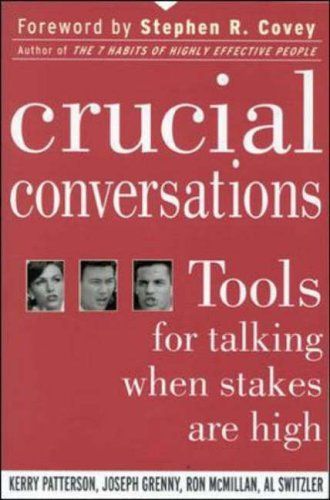
Crucial Conversations Tools for Talking when Stakes are High
The New York Times Bestseller! Learn how to keep your cool and get the results you want when emotions flare. When stakes are high, opinions vary, and emotions run strong, you have three choices: Avoid a crucial conversation and suffer the consequences; handle the conversation badly and suffer the consequences; or read Crucial Conversations and discover how to communicate best when it matters most. Crucial Conversations gives you the tools you need to step up to life's most difficult and important conversations, say what's on your mind, and achieve the positive resolutions you want. You'll learn how to: Prepare for high-impact situations with a six-minute mastery technique Make it safe to talk about almost anything Be persuasive, not abrasive Keep listening when others blow up or clam up Turn crucial conversations into the action and results you want Whether they take place at work or at home, with your neighbors or your spouse, crucial conversations can have a profound impact on your career, your happiness, and your future. With the skills you learn in this book, you'll never have to worry about the outcome of a crucial conversation again.
Reviews
Ani Velasquez@aniruokay
Anton@tonyv
Cristian Garcia@cristian
Colin Das@clocs
brendan sudol@bren
Nikolay Bachiyski@nb
Daryl Houston@dllh
Anyaconda@kaffeeklatschandbooks
Pedro Giménez@pedro
Thu Le@tple
Alican Sungur@asungur
Shohini Gupta@shohini
Erik Horton@erikhorton
Nimit Agrawal@na
LC@lower_colon
Bailey Jennings@baileyjennings
Stephanie Denton@sdenton72
Benan Arigil@benanarigil
Carissa @currancm
Ricardo@ricardobarbosa
Ty@sunkissedfool
Mert@mertb
Christine Bower@cabower
Shibashankar Sahoo@shibhash